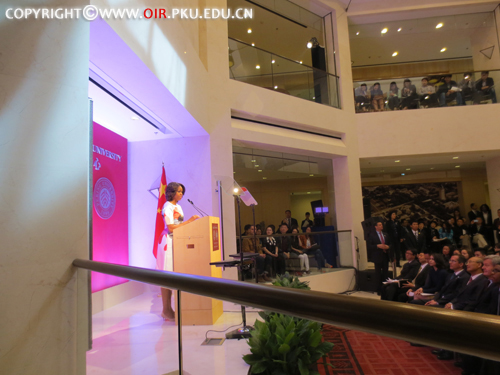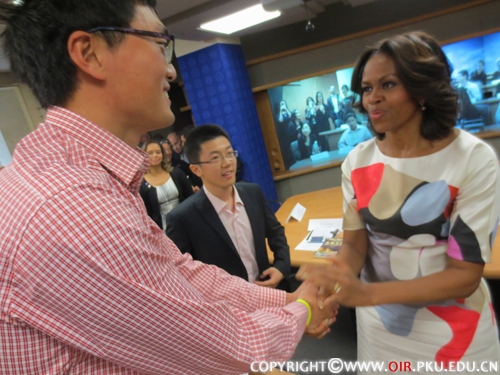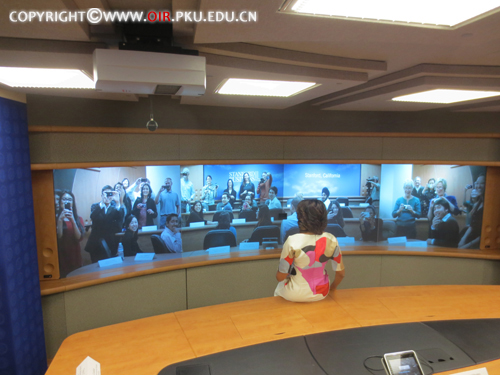Michelle Obama, the First Lady of the United States of America, visited Peking University on March 22, 2014. She interacted with students from PKU, and delivered a speech at the Stanford Center at Peking University

Ni-Hao. It is such a pleasure and an honorto be here with all of you at this great university. Thank you so much forhaving me.
And before I get started today, on behalfof myself and my husband, I just want to say a few very brief words aboutMalaysian Airlines Flight370.As my husband has said, the United States isoffering as many resources as possible to assist in the search. And please knowthat we are keeping all the families and loved ones of those on this flight inour thoughts and prayers at this very difficult time.
And I’m here today because I know that our future depends on connections like these among young people like you across the globe. That’s why when my husband and I travel abroad, we don’t just visit palaces and parliaments and meet with heads pf state. We also come to schools like this one to meet with students like you. Because we believe that relationships between nations aren’t just about relationships between government or leaders…they’re about relationships between people, particularly our young people. So we view study abroad programs not just as an educationalopportunity for students…but also as a vital part of America’s foreign policy.You see, through the wonders of modern technology, our world is more connectedthan ever before.
Ideas can cross oceans with the click of abutton. Companies can do business and compete with companies across the globe.And we can text, email and skype with people on every continent. So studyingabroad isn’t just a fun way to spend a semester-it’s a quickly becoming the keyto success in our global economy. Because getting ahead in today’s workplaceisn’t just about getting good grades or test scores in school…it’s also abouthaving real experience with the world beyond your borders-experience withlanguages, cultures and societies very different from your own. Or, as theChinese saying goes: “It is better to travel ten thousand miles than to readten thousand books.”

But let’s be clear, studying abroad isabout so much more than improving your own future- it’s also about shaping thefuture of your countries and of the world we all share. Because when it comesto the defining challenges of our time – whether its climate change, oreconomic opportunity, or the spread of nuclear weapons…these are sharedchallenges. No one country can confront them alone…the only way forward istogether. That’s why it’s so important for young people like you to live andstudy in each other’s countries. Because that’s how you develop that habit ofcooperation – you do it by immersing yourself in someone else’s culture…bylearning each other’s stories…and by getting past the stereotypes andmisconceptions that too often divide us.
That’s how you come to understand how muchwe all share.
And that’s how you realize that we all havea stake in each other’s success – that cures discovered here in Beijing couldsave lives in America…that clean energy technologies from Silicon Valley inCalifornia could improve the environment here in China… that the architectureof an ancient temple in Xi’an could inspire the design of new buildings inDallas or Detroit.
And that’s when the connections you make asclassmates or labmates can blossom into something more.
That’s what happened when Abigail Colinbecame an American Fulbright Scholar here at Peking University. She and hercolleagues published papers together in top science journals…and they builtresearch partnerships that lasted long after they returned to their homecountries. Professor NiuKe from Peking University was a Fulbright Scholar inthe U.S. last year…and he reported, and I quote, “The most memorableexperiences were with my American friends.”
These lasting bonds represent the truevalue of studying abroad…and I am thrilled that more and more students aregetting this opportunity. China is currently the fifth most popular destinationfor Americans studying abroad. And today, the highest number of exchangestudents in the U.S. are from China. But still, too many students never havethis chance…and some that do are hesitant to take it. They may feel like studyabroad is only for wealthy students, or students from certain kinds ofuniversities. Or they may think to themselves, “Well, that sounds fun, but howwill it really be useful in my life?”
I understand where these young people arecoming from, because I felt the same way back when I was in college. You see, Icame from a working class family … and it never even occurred to me to studyabroad. My parents didn’t get to attend college, and I was focused on gettinginto a university and earning my degree so I could get a job and supportmyself. And for a lot of young people like me who are struggling to afford aregular semester of school, paying for plane tickets or living expenses halfwayaround the world just isn’t possible. And that’s not acceptable, because studyabroad shouldn’t just be for students from certain backgrounds. Our hope is tobuild connections between people of all races and socioeconomic backgrounds,because it is that diversity that makes our country so vibrant and strong … andour study abroad programs should reflect the true spirit of America to theworld.
That’s why, when my husband visited Chinaback in 2009, he announced our 100,000 Strong initiative to increase the numberand diversity of American students studying in China.
And this year, as we mark the thirty-fifthanniversary of the normalization of relations between our countries … the U.S.Government actually supports more American students in China than in any othercountry in the world.

We’re sending high school, college andgraduate students here to study Chinese … we’re inviting teachers from China toteach Mandarin in American school … we’re providing free online advising forstudents in China who want to study in the U.S. … and the U.S.-China Fulbrightprogram is still going strong with more than 3,000 alumni. The private sectoris stepping up as well. For example, Steve Schwarzman, the head of an Americancompany called Blackstone, is funding a new program at Tsinghua Universitymodelled on the Rhodes scholarship.
And today, students from all kinds ofbackgrounds are studying herein China. Take the example of Royale Nicholsonfrom Cleveland, Ohio who attends New York University’s program in Shanghai.Like me, Rayole is a first generation college student…and her mother worked twofulltime jobs while her father worked nights to support their family. Or herexperience in Shanghai, she said, “This city oozes persistence and inspires meto accomplish all that I can.” And then there’s Philmon Haile from theUniversity of Washington whose family came to the U.S.as refugees from Eritreawhen he was a child. Of his experience studying in China, he said, “Studyabroad is a powerful vehicle for people to people exchange as we move into anew era of citizen diplomacy.”
“A new era of citizen diplomacy”—I couldn’thave said it better myself, because that’s really what I’m talking about…I’mtalking about ordinary citizens reaching out to the world. And as I always tellyoung people back in America, you don’t need to get on a plane to be a citizendiplomat. I tell them that if you have an internet connection in your home,school, or library, within seconds, you can be transported anywhere in theworld and meet people on every continent. That’s why I’m posting a daily travelblog with videos and photos of my experiences in China—because I want youngpeople in America to be part of this visit.
That’s really the power of technology— howit can open up the entire world and expose us to ideas and innovations we nevercould have imagined. And that’s why it is so important for information andideas to flow freely over the internet and through the media. Because that’show we discover the truth…that’s how we learn what’s really happening in ourcommunities, our country and our world. And that’s how we decide which valuesand ideas we think and best—by questioning a debating them vigorously…bylistening to all sides of every argument…and by judging for ourselves.
And believe me, I know this can be a messyand frustrating process. My husband and I are on the receiving end of plenty ofquestioning and criticism from our media and our fellow citizens…and it’s notalways easy…but we wouldn’t trade it for anything in the world. Because timeand again, we have seen that countries are stronger and more prosperous hen thevoices and opinions of all citizens can be heard. And as my husband has said,we respect the uniqueness of other cultures and societies. But when it comes toexpressing yourself freely, and worshipping as you choose, and having openaccess to information—we believe those are universal rights that are thebirthright of every person on this planet.
We believe that all people deserve theopportunity to fulfil their highest potential as I was able to do in the UnitedStates. And as you learn about new cultures and form new friendships duringyour time here in China and in the United States, all of you the livingbreathing embodiment of those values. So I guarantee you that in studyingabroad, you’re not just changing your own life…you’re changing the lives ofeveryone you meet. As the great American President John F. Kennedy once saidabout foreign students studying in the U.S., “I think they teach more than theylearn.” And that is just as true of young Americans who study abroad.
All of you are America’s best face, andChina’s best face, to the world. Every day, you show the world your countries’energy, creativity, optimism and unwavering belief In the future. And everyday, you remind us of just how much we can achieve if we reach across borders, and learn to see ourselves in each other…and confront our sharedchallengers with shared resolve. So I hope you all will keep seeking these kinds of experiences. An I hope you’ll keep teaching each other…and learning fromeach other…and building bonds of friendship that will enrich our world fordecades to come. You all have so much to offer, and I cannot wait to see thatyou achieve together in the years ahead.
Thank you so much. Xie—Xie.



